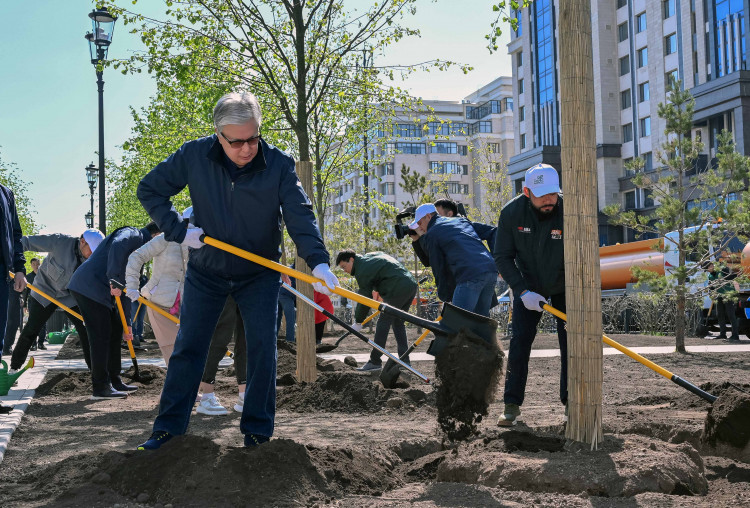ASTANA ( WNAM MONITORING ): At the initiative of President Kassym-Jomart Tokayev, the Taza Kazakhstan large-scale national environmental campaign has become one of the most significant social movements in the country. Its primary goal is not only to improve the ecological situation, but also to instill environmentally responsible thinking, patriotism, and a culture of caring for nature among citizens.
Since its launch, the initiative has united more than 10.4 million people across Kazakhstan. Citizens, businesses, educational institutions, and government officials actively participate in clean-up campaigns, tree planting, and environmental awareness programs, showing that environmental protection has become an integral part of public life, reported the Prime Minister’s press service on Aug. 27.
A strategic policy framework
The movement is closely linked with the implementation of the 2024 Presidential state-of-the-nation address. In October 2024, the government adopted a resolution approving the Taza Kazakhstan concept for the development of environmental culture for 2024–2029. This strategic document sets out the state’s priorities in promoting ecological values and defines concrete measures to foster sustainable development.
Minister of Ecology and Natural Resources Yerlan Nyssanbayev emphasized that the concept focuses on shaping environmental awareness, introducing incentives for responsible lifestyles, strengthening ecological education, and ensuring wide information coverage of environmental problems. A comprehensive action plan provides for landscaping, eco-volunteer initiatives, environmental competitions, and regional adaptation of projects to local needs.
Regional campaigns and mass participation
Since the beginning of the year, more than 767 events have been held nationwide, including campaigns such as Taza kasip – taza aimak (Clean production for a clean region), Kieli meken (protection of natural and sacred sites), Taza olke (general territory cleaning), and Moldir bulak (preservation of springs and reservoirs). These initiatives have mobilized hundreds of thousands of citizens and strengthened cooperation between state bodies, businesses, students, and volunteers.
According to official figures, since the start of Taza Kazakhstan, more than 1.6 million tons of waste have been collected, and 859,000 hectares of land have been cleaned. Around 586,000 volunteers have taken part in these activities.
Waste management and recycling
Responsible waste management is another cornerstone of the initiative. Kazakhstan generates more than 4.5 million tons of municipal waste annually, while the recycling rate in 2024 stood at 25.8%. To address this, eco-boxes and reverse vending machines are being introduced in major cities such as Astana, Almaty, Aktobe, and Ust-Kamenogorsk. These technologies encourage citizens to return plastic and aluminum for bonuses, thus promoting recycling.
In addition, a pilot project has begun in schools. By the end of August, more than 1,000 eco-boxes for separate waste collection will be installed in 129 schools in Astana and Zhezkazgan. According to Nyssanbayev, such measures not only reduce landfill volumes but also cultivate ecological responsibility among the younger generation.
Greening and nature restoration
The initiative also prioritizes reforestation and increasing Kazakhstan’s forest cover. More than 1.3 billion seedlings have been planted, including 48.7 million saxaul on the dried bottom of the Aral Sea. A new forest nursery in Kazalinsk, with a capacity of three million seedlings annually, has been launched, and further projects are under development to restore degraded lands.
Digital tools for ecology
Modern technologies are actively used to enhance the effectiveness of environmental policies. Since 2024, citizens have been able to report local ecological problems through the @TazaQazBot telegram bot. Since the beginning of the year, the platform had received 16,500 requests, of which over 15,000 were resolved. Most reports concerned waste removal, street cleaning, and landscaping. The bot automatically directs complaints to the relevant authorities, ensuring transparency and responsiveness.
The Taza Kazakhstan initiative clearly demonstrates that systematic state support, combined with civic engagement, can deliver tangible results. Nyssanbayev noted, the campaign is not only about cleaning up public spaces but also about cultivating new social ethics and about shaping a nation-wide culture of environmental responsibility.


